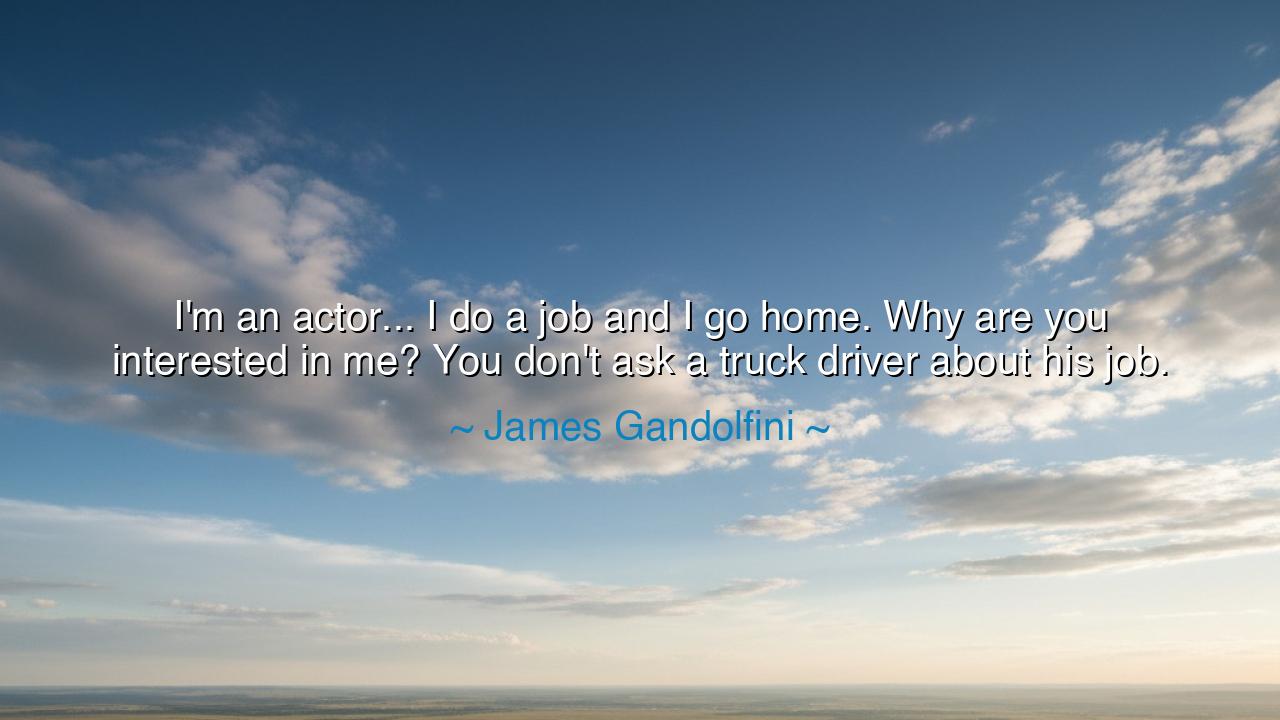
I'm an actor... I do a job and I go home. Why are you interested
I'm an actor... I do a job and I go home. Why are you interested in me? You don't ask a truck driver about his job.






“I’m an actor... I do a job and I go home. Why are you interested in me? You don’t ask a truck driver about his job.” Thus spoke James Gandolfini, a man whose art captured the souls of millions, yet whose heart longed for the quiet dignity of ordinary life. Beneath his simple words lies a profound reflection on humility, fame, and the sacred boundary between the craft and the self. For in an age where the gaze of the world hungers endlessly for spectacle, Gandolfini reminded us that greatness is not the same as glory, and that true mastery lies not in being worshiped, but in being human.
When he says, “I’m an actor... I do a job and I go home,” he is stripping away the illusion that artistry makes one divine. To Gandolfini, acting was a profession — an honest labor, not a crown to be worn. Just as the truck driver drives his route, the mason lays his stone, or the teacher shapes young minds, the actor, too, fulfills his role in the grand economy of life. Yet, society, blinded by celebrity, forgets this truth. It raises its entertainers to impossible heights, and in doing so, forgets the person behind the performance. Gandolfini’s words, humble yet firm, restore the dignity of work to the realm of art, reminding us that craft is service, not self-exaltation.
The ancients would have understood him well. In Greece, the actor — the hypokrites — wore masks not to reveal himself, but to serve the story. The performance was sacred, but the performer was never meant to be worshiped. The true glory belonged to the tale, to the truth it carried. So, too, did Gandolfini live by that code. As Tony Soprano, he gave the world one of the most complex portraits of the human spirit — yet offstage, he refused to feed the cult of celebrity that surrounded him. His humility was his armor, his silence a shield against the devouring curiosity of fame. Like the philosopher Diogenes, who lived in a barrel to prove that greatness required no gold, Gandolfini lived quietly, content to let his work speak while he himself disappeared into the crowd.
And yet, there is something sorrowful in his tone — a fatigue, a longing for anonymity. The artist, who opens his soul for the world to see, pays a great price for recognition. To be known everywhere is to belong nowhere. The public, enchanted by illusion, often mistakes the performance for the person. They demand from the actor not truth, but constant revelation. Gandolfini’s question, “Why are you interested in me?” is both a rebuke and a plea — a cry for privacy, for the right to simply exist beyond the gaze of others. His comparison to the truck driver is not a jest; it is wisdom. For the one who carries goods along the highway and the one who carries emotion through story are equals in labor and in dignity. Both do their work, both return home to rest.
Consider the story of Marcus Aurelius, the philosopher-emperor. Though he ruled the greatest empire of his time, he wrote in his Meditations that he was no different from the farmer, the builder, or the soldier. “A man does not become divine by power,” he wrote, “but by living in accordance with his nature.” Gandolfini’s words belong to that same lineage of thought — the belief that the measure of worth is not in attention, but in authenticity. The true artist does not live to be adored; he lives to create truth, and then to return home to his own life — to his family, his silence, his peace.
In his humility, Gandolfini teaches us the balance between doing and being. The world tells us to perform endlessly, to brand ourselves, to chase validation from unseen crowds. But his wisdom reminds us that a life worth living is not one of constant display, but of quiet purpose. Whether one paints, cooks, drives, or acts, the essence of labor is the same: to give one’s best, and then to rest in simplicity. To go home — that is the completion of every noble act.
So, dear listener, let this teaching take root within you. Do your work with excellence, but do not let the work become your identity. Be grateful when others notice, but never depend on their gaze to confirm your worth. Remember that dignity lies in humility — in the quiet knowledge that what you do, you do well, and that this alone is enough. Like James Gandolfini, finish your task, then return home to what truly matters: your peace, your loved ones, your inner life. For in the end, fame fades, applause dies, and the lights go out — but the man who knows how to go home, who remains human amid the illusions of greatness, carries within him the rarest treasure of all: contentment.






AAdministratorAdministrator
Welcome, honored guests. Please leave a comment, we will respond soon